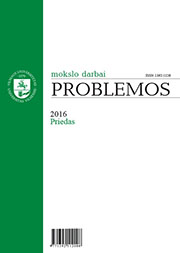Xu Fuguan’s Interpret ation of Zhuangzi’s Aesthetic Thought: Some Methodological
Problems of his Comparative Approach
Xu Fuguan’s Interpret ation of Zhuangzi’s Aesthetic Thought: Some Methodological
Problems of his Comparative Approach
Author(s): Téa SerneljSubject(s): Aesthetics, East Asian Philosophy, Philosophy of Mind, Methodology and research technology
Published by: Vilniaus Universiteto Leidykla
Keywords: Xu Fuguan; Zhuangzi; Chinese Aesthetics; intercultural methodology;
Summary/Abstract: The present article deals with Xu Fuguan’s analysis and interpretation of some of the central concepts of Zhuangzi’s philosophy, which constitute his aesthetic thought. In Xu’s view, Zhuangzi’s aesthetic thought relates to the aesthetic way of human life, where beauty applies to the realm of dao in which human beings are able to liberate their spirit and enjoy a way of life denoted as “free and easy wandering” (xiaoyaoyou 逍遙遊). In Xu’s view, this is the highest and the most beautiful sphere of human existence, and is as such expressed in art. Xu found in Zhuangzi’s concepts of xinzhai心齋and zuowang 坐忘, as methods for achieving this highest level of being, some similarities with certain concepts of late 19th and early 20th century Western phenomenology. Although Xu was trying to be careful in drawing parallels between certain Western philosophies and Zhuangzi’s thought, he believed that there is some resemblance between them, especially regarding the question of why and in which way human consciousness (or the human heart-mind) is able to perceive the world aesthetically. The article aims to show some methodological problems and inconsistencies in this comparative approach, which underlies Xu’s aesthetic theory.
Journal: Problemos
- Issue Year: 2016
- Issue No: Suppl.
- Page Range: 94-108
- Page Count: 15
- Language: English

